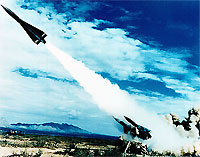Senior Russian MP Says Moscow Can't Take NATO At Its Word On Missile Defence
Interfax - 4.11.12 - JRL 2012-68
Moscow, 11 April: Russia should not take NATO at its word about whether the (European) missile defence system is directed against it, and it has good reason to wait for legally binding guarantees, Aleksey Pushkov, head of the Russian State Duma International Affairs Committee, has said.

file photo
"Why in fact should Russia believe NATO?" Pushkov told journalists when asked why the Russian side does not trust oral assurances about missile defence.
Pushkov said that "as leading NATO countries gave assurances that (UN Security Council) Resolution 1973 on Libya would be use exclusively to defend the civilian population in Benghazi, later for some reason the civilian population in Tripoli began to die and air strikes were launched against districts inhabited by civilians".
"And later three times NATO representatives announced that resolution 1973 gives the right to hunt (former Libyan leader Mu'ammar) Al-Qadhafi, although there was not a word there about Al-Qadhafi, just as no right (was given - Interfax) to destroy the leader of a state, an internationally recognized leader, with whom all the leaders of NATO had met, including Condoleezza Rice, (French President Nicolas) Sarkozy and (former Italian Prime Minister Silvio) Berlusconi," Pushkov said.
Distorting an international document in this way, he said, strongly discredited NATO in the eyes of the Russian population and Russian politicians. "So we have absolutely no grounds to take NATO at its word," Pushkov said, adding that international activity does not have the concept "take at one's word".
Russia needs either legal guarantees of security or a programme that would cover the issues related to the concerns of Russia in the field of its own security.
"NATO proposes either verbal, oral assurances that NATO has no negative intentions regarding Russia, or symbolic acts such as the creation of centres to exchange information, which do bind anyone to anything," he said.
"The missile defence system in Europe rests on one argument: that Iran allegedly presents a certain threat for European states and for the position of the USA in Europe," he said.
"But the US administration says that it will not allow nuclear weapons to be created in Iran, and now there is already talk about possible air strikes on Iran. The Obama administration has said that it is not about deterring Iran, but rather about forcing Iran, either diplomatically or militarily, to give up creating a nuclear weapon," he said.
In this regard, he said, the question arises what Iranian threat this refers to and where it will be.
"Nevertheless, the missile defence system is being prepared, regardless of whether there will be an Iranian threat or not. They have told us that the missile defence system will go ahead without any changes, and it should guarantee the security of the USA and its alliances. Against whom? If Iran is eliminated as a threat, then who will threaten Europe? North Korea? But perhaps they will find Papua New Guinea, and find there some kind of threat. It is completely obvious that this missile defence system has among its potential aims the neutralization of the Russian nuclear